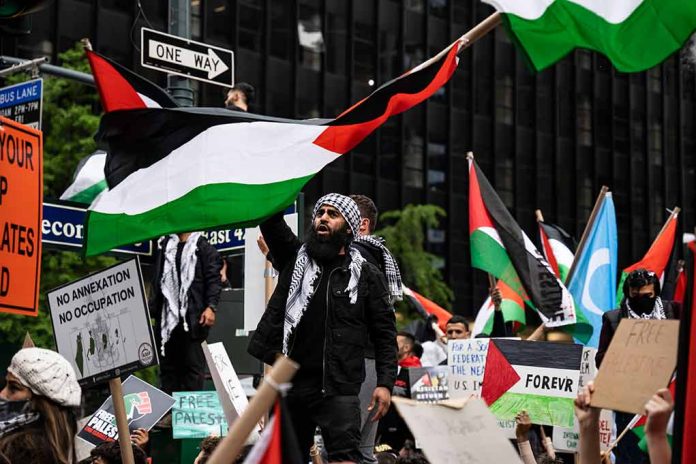
Israel blocks Arab ministers from visiting Palestine, causing Saudi Arabia to condemn the move as “extremism and refusal of peace” in a stark diplomatic confrontation that reveals Netanyahu’s growing isolation from regional peace efforts.
Key Takeaways
- Saudi Arabia harshly criticized Israel for blocking Arab foreign ministers from visiting the West Bank, calling it an act of “extremism and refusal of peace.”
- The blocked delegation included Saudi Foreign Minister Prince Faisal bin Farhan Al Saud, whose visit would have been the first by a top Saudi official to the West Bank in recent memory.
- Israel defended its decision by claiming the Palestinian Authority planned to host a “provocative meeting” focused on Palestinian statehood.
- France and Saudi Arabia will co-host an international conference in New York to discuss Palestinian statehood, security arrangements, and Gaza reconstruction plans.
- The incident adds significant strain to Israel’s diplomatic relations as pressure mounts from the UN and European countries supporting a two-state solution.
Saudi Arabia’s Blistering Response to Israel’s Blockade
Saudi Arabia has delivered a scathing rebuke to Israel after the Netanyahu government blocked a delegation of Arab foreign ministers from visiting the Palestinian West Bank. The Saudi Foreign Minister, Prince Faisal bin Farhan Al Saud, did not mince words during a news conference in Amman, Jordan, characterizing Israel’s decision as proof of its unwillingness to engage in genuine peace efforts. The ministers had planned to meet with Palestinian President Mahmoud Abbas in Ramallah as part of broader diplomatic initiatives supporting Palestinian sovereignty amid the ongoing Gaza conflict.
“Israel’s refusal of the committee’s visit to the West Bank embodies and confirms its extremism and refusal of any serious attempts for [a] peaceful pathway … It strengthens our will to double our diplomatic efforts within the international community to face this arrogance,” Said Prince Faisal, Saudi Foreign Minister.
The significance of this blocked visit cannot be understated. Prince Faisal’s journey would have marked the first visit by a top Saudi official to the West Bank in recent memory, potentially signaling a shift in regional dynamics and Saudi policy toward the Palestinian cause. Israel, which maintains complete control over West Bank airspace and borders, justified its rejection by claiming the Palestinian Authority was orchestrating what they described as a deliberately contentious gathering.
Israel’s Justification and Growing Diplomatic Isolation
The Netanyahu government defended its decision through an unnamed official who stated that the Palestinian Authority, which “refuses to condemn the October 7 massacre,” intended to host what they characterized as a “provocative meeting” focused on Palestinian statehood. This explanation has done little to quell the diplomatic fallout, instead highlighting Israel’s increasing isolation on the world stage. Jordan’s Foreign Minister Ayman Safadi joined in the criticism, accusing Israel of sabotaging efforts toward a comprehensive Arab-Israeli settlement.
” Which to this day refuses to condemn the October 7 massacre – intended to host in Ramallah a provocative meeting of foreign ministers from Arab countries to discuss, according to The Palestinian Authority.
This incident comes at a time when Israel faces mounting pressure from the United Nations and several European nations that have recently recognized Palestinian statehood or voiced strong support for a two-state solution. The timing is particularly noteworthy as international patience with Israel’s military operations in Gaza continues to wane, with humanitarian concerns taking center stage in global discourse.
International Conference Aims to Advance Palestinian Statehood
In response to the deteriorating situation, France and Saudi Arabia have announced they will jointly host an international conference in New York from June 17-20. This high-level gathering will focus specifically on Palestinian statehood and security arrangements following any potential ceasefire in Gaza. The conference represents a significant diplomatic push outside Israel’s control, bringing together nations concerned about the Palestinian cause and the broader stability of the Middle East region.
Egyptian Foreign Minister Badr Abdelatty has indicated that the conference will address comprehensive security plans and reconstruction initiatives for Gaza. A key focus will be preventing Palestinian eviction from their territories, a concern that has gained urgency amid Israel’s expanded settlement activities in the West Bank. The timing of this conference, coming directly after Israel’s refusal to allow Arab ministers into the West Bank, appears designed to send a clear message that regional powers will pursue diplomatic solutions with or without Israel’s cooperation.
Regional Implications and America’s Position
The diplomatic rift exposed by this incident carries significant implications for President Trump’s broader Middle East strategy. The administration has consistently supported Israel’s right to defend itself while also working toward normalizing relations between Israel and Saudi Arabia. This latest development creates a challenging landscape where America’s traditional support for Israel must be balanced against the legitimate concerns of key Arab allies in the region. The administration faces the delicate task of maintaining strong ties with Israel while acknowledging Saudi Arabia’s increasingly vocal stance on Palestinian rights.
For conservative Americans watching these developments, the situation highlights the complex reality of Middle East diplomacy where even staunch allies can find themselves at odds over foundational issues. The Palestinian question continues to be a fault line in regional politics, one that defies simple solutions and requires nuanced diplomacy that respects both Israel’s security concerns and the legitimate aspirations of the Palestinian people for sovereignty and dignity.




